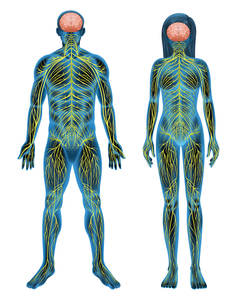When you can't finish a yawn, it means your nervous system isn't releasing as it should.
A healthy nervous system responds to stimulation (both stress and excitement) by regularly discharging the energy.
An unhealthy nervous system has trouble "letting go" creating a backlog of underground tension.
(and eventually causing issues with anxiety and depression)

Author: Dr. Susan LaCombe
Dr. LaCombe is a 30-year veteran Psychologist and Psychotherapist whose passion is leveraging the power of the autonomic nervous system for managing anxiety and depression.


Warning!
This article may cause excessive yawning 🙂
Warning!
This article may cause excessive yawning 🙂
You probably already know . . . yawning is contagious. Yup, we trigger each other with our yawns.
Is there more to it than that? Or are we connected to each other in ways we are unaware of :-O
Trouble having a good yawn?
Have you struggled to yawn . . . you want to yawn but it just doesn't make its way out of you?
Or maybe you can yawn but it's so half-hearted, it feels totally dissatisfying.
Issues related to yawning are actually an indication the autonomic nervous system is under functioning.
One of the key roles the nervous system plays is to manage the charge in your body.
That "charge" is the felt by you when you're nervous. It's also reflected in the vibrational quality of certain organs in your body including your heart and specific areas of the brain.
You might also notice it as a felt sense of arousal in your body. Sometimes, that charge is high . . . so high, you feel quite tense. Regardless of whether you notice it or not, your nervous system is always humming in the background.
In the field of body psychotherapy, we refer to it as your "activation". So your activation can be low or high depending on how your nervous system is functioning.
We also use the term 'setpoint' to refer to a baseline neutral state where your nervous system is in balance (or homeostasis). This is an energy efficient state that all organisms achieve.
By the way, this "nervous" energy is not only felt by tension and other sensations in your body, it's also precisely measured through your heart rate variability**.
**Heart rate variability is a physiological measure between heart beats. The higher your variability the healthier your autonomic nervous system.
How the nervous system "learns"
Your nervous system is like a sophisticated learning machine, constantly updating its operations based on your life experiences. Think of it as your body's security system - one that's been carefully programmed by every significant moment in your life.
Every experience you've had - from your earliest moments in the womb, through birth, and into your present life - has taught your nervous system what to expect from the world. These experiences create what we call your "activation level" or "setpoint" - essentially, your body's baseline state of readiness.
Here's how it works:
When you encounter situations that feel threatening (whether physically or emotionally):
- Your nervous system records these experiences
- It adjusts its baseline activation level upward
- It stays more alert, ready to protect you
- Your capacity to fully relax becomes limited
When you regularly experience safety and connection:
- Your nervous system learns the world is generally safe
- Your baseline activation level naturally lowers
- You can more easily move between alertness and relaxation
- Complete, satisfying yawns come naturally
Think about the difference between a cat in a loving home versus a stray cat. The house cat easily falls into deep sleep, stretches fully, and yawns completely. The stray, however, remains vigilant, never fully relaxing - because its nervous system has learned it needs to stay on guard.
Similarly, your ability to feel safe in your current life isn't just about your present circumstances - it's shaped by what your nervous system has learned through past experiences, especially through early relationships with parents and caregivers.
This learning is primarily physical, not mental. That's why simply understanding that you're safe isn't enough to change deep patterns of tension or anxiety. Your nervous system needs to learn safety through direct experience - much like learning to ride a bicycle or swim.

When we're feeling safe, it's easier to let go into a complete yawn.
Whether you feel safe in your life depends on what your nervous system has learned from the past, especially through physical traumas and early relationship experiences with parents and caregivers.
The good news?
Just as your nervous system learned to stay on guard, it can learn to feel safe again. This remarkable adaptability - what scientists call neuroplasticity - means that with the right support, your nervous system can develop new patterns of regulation and release.
In other words, your activation level determines to what degree your nervous system will feel wary.
Contrast that with the fact that the lower your activation level, the more safe you feel and the easier it is to 'let go' into a big satisfying yawn.
Learning to complete a yawn
Signs of an Overwhelmed System
Let's talk about how an overwhelmed nervous system shows up in your body - and why those incomplete yawns are telling us something important.
The Incomplete Yawn
Have you noticed how your yawns seem to get "stuck"? Maybe you feel the urge to yawn, but it just won't come out fully. Or perhaps when you do yawn, it feels unsatisfying - like an itch you can't quite scratch. This isn't just frustrating - it's your body telling you something important.
A complete yawn is one of your nervous system's natural ways of releasing tension. Think of it like a pressure valve: when working properly, it allows excess energy to flow out smoothly. But when your system is overwhelmed, this valve gets stuck partially closed.
Beyond the Yawn
An overwhelmed nervous system doesn't just affect your yawning. Here are other signs you might recognize:
- Tension that won't fully release, even when you try to relax
- Shoulders that seem fixed in an awkward position
- Breathing that stays shallow or feels restricted
- A constant sense of being "on edge"
- Difficulty settling down at night
- Feeling tired but wired
At this point, yawns become incomplete.
You're no longer able to let go into a satisfying yawn.

When the nervous system is "on guard", a good yawn is easily interrupted.
The Build-Up Effect
When your nervous system can't fully release, it's like a backup in your body's energy system. This accumulated tension can lead to:
- Anxiety: That jittery, restless feeling is actually backed-up energy looking for a way out
- Depression: When your system gets overwhelmed by held energy, it might shift into a shut-down state
- Sleep issues: Your body needs to feel safe to fully rest
- Digestive problems: Tension affects all your body's systems
- Muscle pain: Particularly in the jaw, neck, and shoulders
The shaky, tingling sensations you might feel during anxious moments? That's actually your body trying to release some of this backed-up energy. But when your nervous system is overwhelmed, even these natural release mechanisms get interrupted.
The Hidden Cost
Living with an overwhelmed nervous system is like trying to drive with the parking brake on. Everything takes more effort than it should. Simple relaxation becomes a challenge.
And those incomplete yawns? They're just the tip of the iceberg - a visible sign of a system that's working too hard to keep you safe.
The Path to Change: Rediscovering Your Natural Release
As a therapist specializing in somatic (body-based) approaches, I've witnessed something remarkable: people can rediscover their ability to yawn fully, and with it, their capacity to truly relax.
Let me share what I've learned about this journey of nervous system healing.
From Incomplete to Complete
One of the most fascinating "little gems" I've discovered in my practice is how yawning changes as healing progresses. It's like watching a flower slowly unfold:
- First, clients notice they can yawn more frequently
- Then, yawns become deeper, more complete
- Finally, they experience that delicious "after-yawn glow" - a natural wave of relaxation washing over their body
Think back to the last time you had a truly satisfying yawn. Remember that gentle, peaceful feeling afterward? That's your nervous system working exactly as nature intended.

Our bodies are designed to release tension naturally, just like our animal friends do.
How Real Change Happens
Through somatic therapy approaches like Self-Regulation Therapy, I work directly with your nervous system to:
- Gently release stored tension
- Reset your body's baseline activation level
- Rebuild your capacity for deep relaxation
- Restore natural release mechanisms like yawning, tingles, and subtle movements
You see, when clients come to see me for therapy, it's often quite evident that their nervous system is having trouble letting go.
This isn't about forcing yourself to relax. Instead, it's about creating the conditions where relaxation happens naturally.
What Makes This Approach Different
Traditional approaches often focus on managing symptoms or changing thoughts. While these can be helpful, they may miss something crucial: your nervous system's need to feel safe at a fundamental level.
When we work somatically:
- We listen to your body's signals
- We move at a pace that feels safe
- We build capacity gradually
- We restore natural rhythm and regulation
It's like teaching a tight muscle to relax - not by forcing it, but by reminding it how to let go.
And . . . they can't let go into a good yawn.
However, as our work proceeds, one thing always seems to happen—they're finally able to have a good yawn!
The Ripple Effect
The beauty of nervous system healing is how it affects every aspect of your life. Just as tension can restrict your yawn, it can restrict your capacity for joy, connection, and peaceful rest.
As your system learns to release and regulate, you're not just gaining the ability to yawn fully - you're expanding your capacity for a fuller, more relaxed life.
Remember: Your nervous system's current patterns took time to develop, and sustainable change takes time too.
But just like water gradually shapes stone, gentle, consistent attention to your nervous system creates profound transformation.
A Personal Note to Parents

If you've read this far, you might be recognizing your own struggle with incomplete yawns - that frustrated feeling when your body won't fully release into relaxation.
Perhaps you're noticing how this relates to other patterns in your life, like anxiety or tension that just won't quite let go.
Here's something crucial I've learned in my 20 years as a psychologist: Your nervous system is your child's first teacher. Every time you interact with your little one - whether you're soothing them to sleep, responding to their cries, or simply being present - your own nervous system is teaching theirs what "normal" feels like. They're learning, at a profound biological level, how to regulate their own emotional world.
I often see parents experience two reactions to this information: relief at understanding their struggles weren't their fault, followed by worry about how their nervous system might affect their children. Both reactions are completely natural.
But here's what fills me with hope every day in my practice: Your nervous system isn't fixed. Just as it learned to stay on guard, it can learn to feel safe again. I've witnessed countless transformations through somatic therapy - parents discovering they can feel fundamentally different, more regulated, more present. When you work directly with the nervous system, change happens at a deeper level than just "thinking differently" or "trying to relax."
If you've tried various approaches before without lasting success, please understand - this is different. Remember how I mentioned that your body keeps a record of every experience? Well, it also has an remarkable capacity to rewrite that record. Those incomplete yawns can become full again. That perpetual guard can soften.
Even if you're hesitant to invest in your own healing, consider this: By nurturing your nervous system's capacity to feel safe and regulated, you're giving your children an invaluable gift - the template for emotional well-being that will serve them throughout their lives.
Your children deserve a parent who can yawn fully, laugh freely, and feel truly at ease in their own body. And you deserve that too.
The tightness in your chest? Yes, that's the anxiety.
If this situation becomes chronic, you're at risk for depression.
By the way, it's been the experience of body psychotherapists that if you allow yourself to feel these body sensations, you help the process along.
Certain psychotherapies are especially good at helping the discharge process (e.g. Self-Regulation Therapy in Canada, Body Psychotherapy in the UK and Somatic Experiencing and Sensorimotor Psychotherapy in USA).
Therapy not your thing?
Yes, there are online programs that can help. Try myShrink's very own De-Coding the Brain.
References
Heller, Diane P. (2001). Crash Course: A Self-Healing Guide to Auto Accident Trauma & Trauma Recover. Berkely, California: North Atlantic Books.

